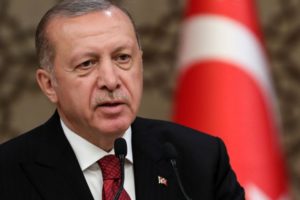Currencies of emerging markets are in doubt
For some time now, we have been hearing more and more about the economic slowdown, which is starting to catch up with world leaders. Leading analysts (mainly the largest investment banks of JPMorgan or BNP Paribas Asset Management, Citigroup) indicate that the current bull market may quickly break up in the second quarter. Reason? It is not reflected in the currencies of developing countries.
Read: The oil price is growing on the wave of conflicts
MSCI currencies are not convincing
One of the main reasons for weak performance in emerging market currencies is the FED policy. The institution has repeatedly emphasized that it wants to stabilize the economy and remove tensions and anxiety in the markets. Strong dollar and weak euro are in no way an optimistic forecast for the MSCI index currencies. What's more, the weak euro stopped growth on many other Emerging Market denominations in relation to the US dollar.
Quite recently, Pierre-Yves Bareau, Emerging Markets Specialist in the field of debt securities, when asked about the weak currency of countries from the MSCI index, said:
"I see two challenges for EM currencies. First of all, the US dollar is still quite strong. Secondly, the market must see economic growth to buy up delays in the growth of the market with 2018. "
Monetary policy EM
According to generalized theses regarding the possible strengthening of emerging market currencies, we can expect to see more in the second quarter of 2019. This is mainly due to better data from the Chinese economy. For the time being, the activities of the central banks of the countries included in the MSCI do not impose outstanding changes in the monetary policy. The only exception is India, which last week lowered its reference rate for the second time this year.
Currency growth limited
Here, mainly political issues are creeping in, namely, elections and fiscal policy. In recent weeks, there have been votes in Turkey, Nigeria, Thailand, but the upcoming period will make elections in the Philippines, Indonesia and South Africa. This is a period of increased volatility, which will largely have an adverse effect on EM money. Variability created by politics has had the biggest impact in Turkey. Recent restrictions imposed by the president of this country in terms of lending policy have caused a wave of confusion on the lira.






















![Forex Club – Tax 9 – Settle tax on a foreign broker [Download the Application] Forex Club - Tax 9](https://forexclub.pl/wp-content/uploads/2024/02/Forex-Club-Podatek-9-184x120.jpg?v=1709046278)
![Trading View platform – solutions tailored to the needs of traders [Review] trading view review](https://forexclub.pl/wp-content/uploads/2024/03/trading-view-recenzja-184x120.jpg?v=1709558918)
![How to connect your FP Markets account to the Trading View platform [Guide] fp markets trading view](https://forexclub.pl/wp-content/uploads/2024/02/fp-markets-trading-view-184x120.jpg?v=1708677291)
![How to invest in ChatGPT and AI? Stocks and ETFs [Guide] how to invest in chatgpt and artificial intelligence](https://forexclub.pl/wp-content/uploads/2023/02/jak-inwestowac-w-chatgpt-i-sztuczna-inteligencje-184x120.jpg?v=1676364263)


![Izabela Górecka – “Success on the market depends not only on knowledge, but also on emotional stability” [Interview] Izabela Górecka - interview](https://forexclub.pl/wp-content/uploads/2024/04/Izabela-Gorecka-wywiad-184x120.jpg?v=1713870578)
![WeWork – the anatomy of the collapse of a company valued at $47 billion [WeWork, part II] wework bankruptcy story](https://forexclub.pl/wp-content/uploads/2024/04/wework-bankructwo-historia-184x120.jpg?v=1711729561)
![Adam Neumann – the man who screwed up Softbank [WeWork, part AND] adam neumann wework](https://forexclub.pl/wp-content/uploads/2024/04/adam-neumann-wework-184x120.jpg?v=1711728724)





![How to transfer shares to another brokerage office [Procedure description] how to transfer shares to another brokerage house](https://forexclub.pl/wp-content/uploads/2024/03/jak-przeniesc-akcje-do-innego-biura-maklerskiego-184x120.jpg?v=1709556924)
![The most common mistakes of a beginner trader - Mr Yogi [VIDEO] Scalping - The most common mistakes of a beginner trader - VIDEO](https://forexclub.pl/wp-content/uploads/2024/03/Scalping-Najczestsze-bledy-poczatkujacego-tradera-VIDEO-184x120.jpg?v=1711601376)
![Learning patience: No position is also a position - Mr Yogi [VIDEO] Scalping - Learning patience - No position is also a position - VIDEO](https://forexclub.pl/wp-content/uploads/2024/03/Scalping-Nauka-cierpliwosci-Brak-pozycji-to-tez-pozycja-VIDEO-184x120.jpg?v=1710999249)
![When to exit a position and how to minimize losses - Mr Yogi [VIDEO] Scalping - When to exit a position and how to minimize losses - VIDEO](https://forexclub.pl/wp-content/uploads/2024/03/Scalping-Kiedy-wyjsc-z-pozycji-i-jak-minimalizowac-straty-VIDEO-184x120.jpg?v=1710336731)


















